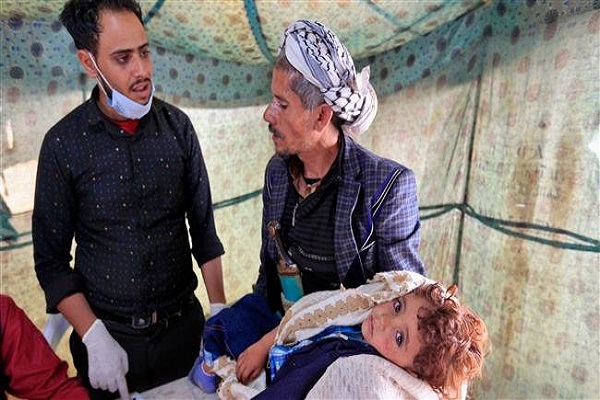Cholera Outbreak Picks Up in Yemen Again

Nearly four years of aggression by the Saudi-led coalition have crippled healthcare and sanitation systems in Yemen, where some 1.2 million suspected cholera cases have been reported since 2017, with 2,515 deaths.
The World Health Organization (WHO) warned in October that the outbreak is accelerating again with roughly 10,000 suspected cases now reported per week, double the average rate for the first eight months of 2018.
“We receive information of reported cases of cholera from the Ministry of Health, then the team sterilizes the house and 20 houses around it,” Nabeel Abdullah al-Wazeer, Yemen’s minister of water, told Reuters in Sanaa.
“We worked from house to house and on sterilizing water wells. We also worked on bus-mounted tanks, which transport water in the private sector to the citizens, as well as sterilizing local institutions which distribute water.”
Adel Moawada, director general of technical affairs at Sanaa’s main water sanitation plant, said there are currently 20 automated chlorination units installed in wells directly linked to the capital’s water distribution network.
Cholera, which is spread by consuming contaminated food or water, is a diarrheal disease and can kill within hours. While previous outbreaks may have helped build immunity in the population, other diseases and widespread malnutrition can weaken resilience.
The United Nations says about 14 million people, or half of Yemen’s population, could soon face famine. Some 1.8 million children are malnourished, according to UNICEF.
Children account for 30 percent of cholera infections.
Pediatrician Mohammed Abdulmughni administers intravenous fluids to children in WHO tents in Sanaa. Their beds rest on gravel and flies circle their faces.
“With winter’s arrival we expected the numbers would decrease, yet the cases have been coming in at the same pace,” he said. “We expected positive (diagnoses) cases to decrease but the cases remain high.”
If caught early, acute diarrhea can be treated with oral hydration salts, but more severe cases require intravenous fluids and antibiotics.
More than 250,000 cases of cholera have been recorded in Yemen since the beginning of 2018, with 358 associated deaths, UNICEF representative Meritxell Relano told Reuters.
“We have prevented an outbreak at the scale of 2017,” Relano said. “But the risk is still there.”
Some 15,000 Yemenis have been killed and thousands more injured since the onset of the Saudi-led aggression.
The Saudi-led aggression has also taken a heavy toll on the country's infrastructure, destroying many hospitals, schools, and factories. The United Nations has already said that a record 22.2 million Yemenis are in dire need of food, including 8.4 million threatened by severe hunger.
Several Western countries, the United States and Britain in particular, are also accused of being complicit in the ongoing aggression as they supply the Riyadh regime with advanced weapons and military equipment as well as logistical and intelligence assistance.



